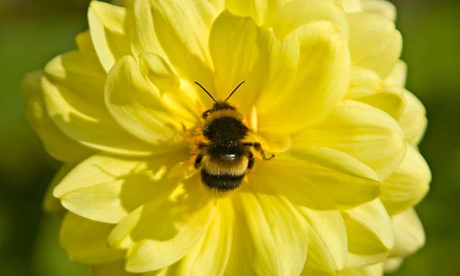
It’s a startling fact that one third of everything we eat depends on the presence of the humble bee for its existence. Without bees, a whole range of food crops, from almonds to watermelons, would simply stop producing. If the trend of the last decade or so that has seen bee populations decline – as a consequence of disease, pesticide use and other environmental factors – were to continue, food supplies would collapse and prices would soar, resulting in a crisis as great as any we have ever experienced.
These gloomy thoughts were triggered as I read Alex Finlay’s recent book-length bee poem Global Oracle. The poem encompasses many of the important roles that bees have played in human culture, from their association with the oracle at Delphi to their place in rural weather lore. As I read the book, I was also struck by how often bees have appeared in poetry down the centuries.
The apian association with magic and the fairy world lies behind Shakespeare’s great song Where the bee sucks, there suck I, which is sung by Ariel at the moment when he learns that he is to be set free by his master Prospero. The image of the bee both returns the fairy to his small world and stands as a symbol of happy idleness in a land of milk and honey.
These associations ultimately derive from the place of bees in various forms of ancient worship. In a poem called, simply, Bees, the Australian poet Diane Fahey notices the creatures in her garden and thinks of “golden honeycomb//of Daedalus,/the twinned bee brooch/from Knossos” and the association leads her to understand something of the bee’s foundational role in the natural world.
In a similar vein, Franz Wright reconstructs the role of the bee in the rites of Eleusis, an ancient Greek fertility cult that Wright sees as having been all but ousted by the more destructive cult of Christianity but which survives through the continued presence at the site of the very flowers and bees that made it possible in the first place.
It may be fanciful to see a thread of continuity between the mysteries of Eleusis and the old American custom of telling the bees when their keeper died, although the linking of bees and the cycle of life and death in both is tantalising. This custom has been celebrated in a number of poems, perhaps the best-known being by John Greenleaf Whittier, but my own favourite is by one-time poet laureate of Maryland Lizette Woodworth Reese.
In her poem The Miracle of the Bees and the Foxgloves, Anne Stevenson undercuts myth and magic with a sharp dose of science. Her bees are impersonal agents of the foxglove’s genetic imperative to reproduce in a process that is “undistracted by a Mind, or a Design, or by desire”, and none the less miraculous for it.
In Ralph Waldo Emerson’s The Humble-Bee, the insect represents a kind of natural wisdom. Its innate habit of seeking out beauty, in the form of flowers, and of ignoring anything that might cause it woe makes it “wiser far than human seer” and leads the philosopher-poet to want to follow its example.
In Rosalind’s Madrigal, Thomas Lodge, a contemporary of Shakespeare, sees a parallel between the bee’s sting and Cupid’s arrows, and so the bee becomes an image of love, being both a welcome companion and a disrupter of rest at one and the same time. In the end Rosalind decides the pain of having love is less than the pain of losing it and so pledges to suffer the bee’s stings gladly.
This roundup of bee poetry wouldn’t be complete without reference to their chief role as pollinators. Neither could I end without including a poem by bee-lover-in-chief Emily Dickinson. Her To make a prairie it takes a clover and one bee is a brief hymn to the power of human imagination, which is, in its own way, as great a pollinator as any bee.
And so this month’s challenge is to have your imagination fertilised by thoughts of bees. Be they magical, mythological or common-or-garden pollinators, they deserve to have their praises sung. Why not share your apian odes here?

